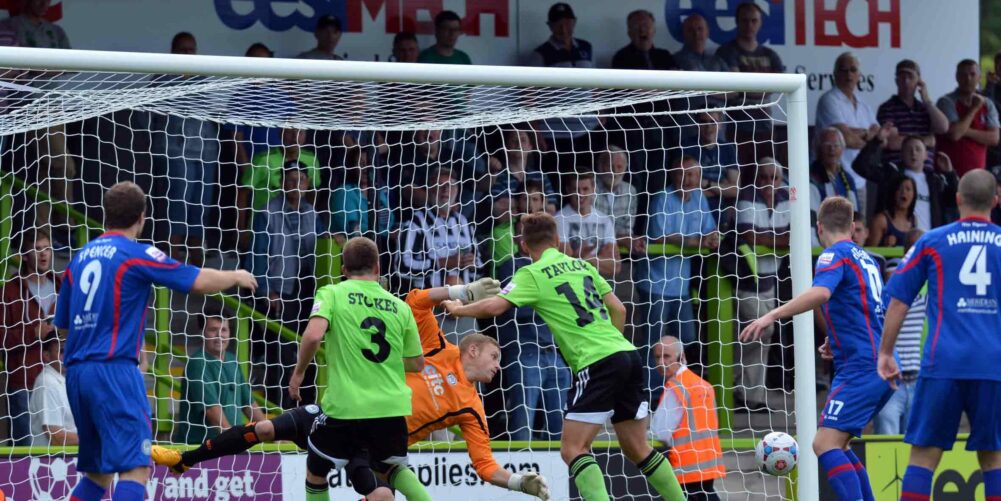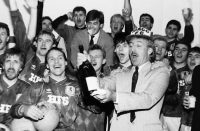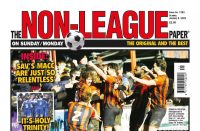RAMPANT: Forest Green Rovers put eight goals past Hyde FC on the opening day. Picture: Bruce Fenn
By Steve Tervet
There’s disappointing seasons, there’s very bad seasons and then there’s the 2013-14 campaign as endured by Hyde FC!
Forty-six games, one win, 10 points. TEN. The history books show the Tigers were the worst team in Conference history.
So where did it all go so wrong for the Greater Manchester outfit? After all, they’d managed to survive their first season in Non-League‘s top flight, winning more than a third of their games.
“That was definitely a minor miracle,” said Scott McNiven, who replaced Gary Lowe as manager following Hyde’s march to the Conference North title in 2011-12.
“We didn’t start great but we played some good stuff. The players I had in the first year were different class and it was understated what they achieved for the budget we had.”
McNiven, who played more than 200 games for Oldham, had finished his playing career at Hyde before briefly stepping up as joint-manager alongside Steve Halford. The pair kept the Tigers in Conference North but it was Lowe who got the nod that summer.
“Gary did an unbelievable job getting Hyde promoted,” said McNiven. “But he couldn’t agree on the way forward and fell out with the chairman, John Manship. Hyde’s very much run on a cost basis and John was never going to break the budget just because they were in the Conference.
“He asked me if I fancied having a go and I jumped at the chance because not many get the opportunity.”
McNiven appeared to have found a good formula by appointing former Aston Villa and Bolton midfielder Gavin McCann and the vastly experienced Dave Worthington to his backroom staff.
But survival in the first season proved to be a false dawn. Phil Jevons moved on to Stockport, Scott Hogan joined Rochdale – Aston Villa would later come calling – and Matt Blinkhorn, another scorer of crucial goals, was now at AFC Fylde.
McNiven said: “We tried to replace them with similar quality and desire and we thought we weren’t a million miles off.”
But the Tigers were handed a brutal reality check on the first day of the new campaign. Marcus Kelly, James Norwood, Matthew Barnes-Homer and Danny Wright ran riot as Forest Green thrashed them 8-0.
An early red card hadn’t helped Hyde’s cause but the nature of the collapse was disturbing and three days later, they conceded a last-minute winner at home to Southport.
“Losing the two games the way we did was a kick in the teeth,” admitted McNiven. “It took more out of the lads than I thought it would.”
Subsequent back-to-back draws against Hereford and Wrexham suggested the Tigers had steadied the ship but the worst was yet to come.
They lost the next 13, drawing blanks in all six home games, and had been cut adrift by the turn of the year. In total, Hyde picked up just one point from a possible 66 during a run as barren as anything the division has ever seen.
But McNiven said: “Some of the stuff we played in the second year was actually better than the first. Some of the goals we scored, there were 20-30 passes involved and we’d slot it away – but we’d always lose in the last 5-10 minutes. It was sickening to take when you knew how hard the lads were working.
“The chairman could see what we were trying to do and he stuck with us because he liked watching us play. He knew we were going to attack teams.
“We never went defensive and maybe that was our downfall. Teams knew we would play open football and that probably led to many of the results.
“But that’s what won us the results in the first season and I didn’t want to become a defensive manager. I didn’t want to change the way I thought football should be played but maybe, looking back, I should have done.”
There were days when Hyde almost broke the drought. They led 3-2 at Dartford late on but lost 4-3. Nuneaton scored a last-minute equaliser to deny them a 2-1 win weeks later.
“It sounds stupid but we weren’t playing bad,” said McNiven. “But the longer it went without that first win, the harder it was for the lads to stick with it for 90 minutes.
“It mentally drained a few of the players and they lost belief in how we were playing.
“Once you’re down, football is brutal. Other teams put their foot on your throat and kill you off. We stuck in the game for 70-80 minutes but any mistake the lads made, we were punished.”
The defeats were getting heavier. Hyde lost 4-0 to Halifax, 5-2 to Wrexham and 6-2 to Forest Green. Cambridge put seven past them during the run-in.
But the club’s self-deprecating Twitter page was beginning to turn heads and Hyde’s profile grew as their chances of staying up all but disappeared.
There were more than 1,500 retweets for “Hey, Twitter, what time is it? It’s 5-2 Wrexham! HAHAHA #rofl #bantz” while another 1,200 shared the news that “Hayley Cropper hasn’t died, she’s our new centre-half.”
“It was a fine line,” said McNiven. “We didn’t want to take ourselves too seriously but at the same time, we wanted to be seen as a good semi-pro club. I knew all the players would be reading that on Twitter.
“Looking back, I don’t know if they wanted to be a celebrity team rather than a proper team. It can affect players in different ways when they see things not taken seriously in the media.
“When the club are not taking themselves seriously on Twitter, it can knock down to the team. ‘Why should we try to win when we get more praise for losing?’
“Jeff Stelling was on us every week and players do think about stuff like that.”
Finally the spell was broken, Louis Almond and Connor Hughes securing a 2-0 midweek win at Welling which sparked another social media storm.
McNiven said: “It was a long time coming. I tried not to do too much media stuff after the game because I didn’t want to be seen as a joke or take away from what the opponents were doing. I wanted to keep my professional pride and wanted to do my best for the players because they were training hard and trying their best on the pitch. That’s all I could ask.”
Hyde were relegated on March 11, with nine games still to play. They lost the last eight but McNiven stayed to the end.
“We were so close to being a good team that I didn’t want to give up,” he said.
“Management is a lonely profession and you learn a lot about yourself. I was pleased I never quit. I tried to be positive all the time – even in the worst circumstances.
“I wanted to believe I could change it but losing is a habit – and we couldn’t kick ourselves out of it.”























